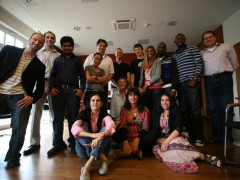-
Natural Resource Abundance and Economic Growth
Written by Mario Wiedemann
One of the surprising features of modern economic growth is that economies abundant in natural resources have tended to grow slower than economies without substantial natural resources. In this paper we show that economies with a high ratio of natural resource exports to GDP in 1970 (the base year) tended […]
-
From Curse to Blessing. Natural Resources and Institutional Quality
Written by Mario Wiedemann
Can a country have plenty of natural resources and yet fail to grow and develop? The resource curse paradox is more than a “worstcase scenario.” There is robust empirical evidence for a negative relationship between natural resource wealth and economic growth. [issuu layout=http%3A%2F%2Fskin.issuu.com%2Fv%2Flight%2Flayout.xml showflipbtn=true documentid=110509095345-14013963d43e452c9c0528f85a245299 docname=world_bank_from_curse_to_blessing username=FutureChallenges loadinginfotext=From%20Curse%20to%20Blessing.%20Natural%20Resources%20and%20Institutional%20Quality showhtmllink=true tag=botswana […]
-
Curse or Blessing? Natural Resources and Human Development
Written by Mario Wiedemann
This paper argues against a natural resource curse for human development. We find evidence that changes in human development from 1970 to 2005, proxied by changes in the Human Development Index, are positively and significantly correlated with natural resource abundance. While our results are consistent with those of other authors […]
-

Workshop with FutureChallenges’ Regional Editors
Written by Mario Wiedemann
One of the participants called it the “fairytale town”. He was talking of Rietberg, a small city near the head office of the Bertelsmann Stiftung (Gütersloh). This was a nice setting for the second FutureChallenges Regional Editors Workshop from 16th May to 18th May. FutureChallenges’ Regional Editors coordinate regional groups […]
-
Why civil society matters
Written by Tom Fries
Stuart Etherington, writing in the Guardian, gives a great overview of why “civil society is an essential part of a truly vital world”. Read more
-
The Africa Competitiveness Report
Written by Gudrun Porath
The Africa Competitiveness Report (2011, World Economic Forum) highlights areas where they need an urgent policy action and investment to ensure that Africa sustains its economic recovery and quality of life continues to grow in the future. Read more
